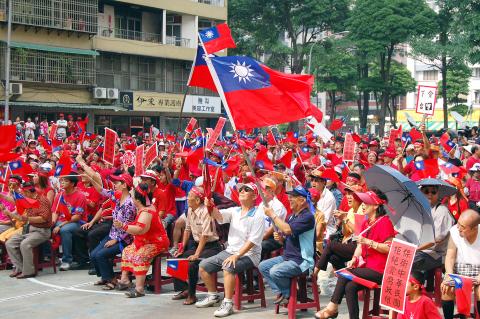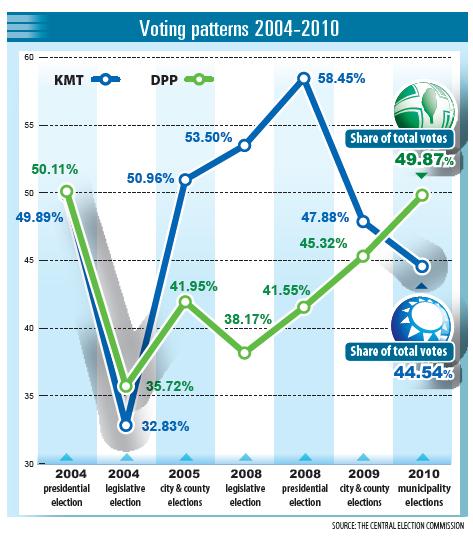The likelihood that the Democratic Progressive Party (DPP) would win the presidential election in 2012 surpassed that of the Chinese Nationalist Party (KMT) following Saturday’s special municipality elections, a university prediction center said yesterday.
Prediction markets are speculative exchanges, with the value of an asset meant to reflect the possibility of a future event. Members can tender virtual bids on events, with the bidding price reflecting the probability.
Results from the five elections showed that although the KMT won three of the five mayoral seats, it gained only 44.5 percent, or 3.4 million, of the total votes compared with the DPP’s 49.9 percent, or 3.8 million votes.

PHOTO: HOU CHENG-HSU, TAIPEI TIMES
On a scale of NT$0 to NT$100, National Chengchi University’s Prediction Market Center said the odds that the KMT would win the 2012 poll dropped from NT$49.4 on Oct. 26 to NT$46.7 on Saturday.
In contrast, the value of the DPP stood at NT$56.9 yesterday, an increase of NT$5.3.
The center said since the two parties completed nominations for Saturday’s elections at the end of May, the prospects of their winning the 2012 presidential election remained at around NT$50. However, the price of the KMT fell to NT$48.6 on Nov. 14 and down to NT$46.7 on Thursday. That of the DPP increased to NT$53.1 at the end of last month and reached NT$55.3 on Friday.

GRAPHIC: TT
The center also surveyed the possibility of President Ma Ying-jeou (馬英九) winning re-election in 2012. The center said the price hovered around NT$34 and NT$35 between May 27 and Nov. 14. It fell to NT$32.6 on Nov. 15 and descended further to NT$30.3 on Saturday. The special municipality elections clearly had an impact on Ma’s chances of winning, the center said.
Of the nominees, Ma remained the most favored KMT candidate, whose latest price was NT$77.7 yesterday. Legislative Speaker Wang Jin-pyng (王金平) was valued at NT$16.2, Greater Taichung mayor-elect Jason Hu (胡志強) was NT$5.8 and Sinbei City mayor-elect Eric Chu (朱立倫) was NT$5.4.
Among the DPP’s possible presidential hopefuls predicted by the center were DPP Chairperson Tsai Ing-wen (蔡英文), former premier Su Tseng-chang (蘇貞昌) and former premier Frank Hsieh (謝長廷).
The center said that the likelihood that Tsai would represent her party in the 2012 election was NT$40 on May 27 and increased to NT$42.5 on June 21, but plunged to NT$32.6 on Thursday. However, it climbed up to NT$35.5 after Saturday’s elections.
That of Su was NT$12.4 on Nov. 20 and rose to NT$14.6 on Friday. It jumped up to NT$29.1 yesterday.
Hsieh’s value surged from NT$17.5 on June 25 to NT$44 on Friday. It has since dropped, however, to NT$39.9.
Despite the latest values suggested by the prediction market center, re-elected Taipei Mayor Hau Lung-bin (郝龍斌) said yesterday he was optimistic that Ma would be re-elected in 2012.
Hau said the party’s three-to-two win is “a good sign” that the KMT has risen from a position where its strongholds were believed to have been at risk.
“I am cautiously optimistic about President Ma’s chances in the 2012 election,” Hau said, adding that the shaky forecasts of the party’s performance in the elections were due to the global financial crisis and the problems caused by Typhoon Morakot, Taiwan’s deadliest storm ever, which hit on Aug. 8 last year.
ADDITIONAL REPORTING BY CNA

Right-wing political scientist Laura Fernandez on Sunday won Costa Rica’s presidential election by a landslide, after promising to crack down on rising violence linked to the cocaine trade. Fernandez’s nearest rival, economist Alvaro Ramos, conceded defeat as results showed the ruling party far exceeding the threshold of 40 percent needed to avoid a runoff. With 94 percent of polling stations counted, the political heir of outgoing Costa Rican President Rodrigo Chaves had captured 48.3 percent of the vote compared with Ramos’ 33.4 percent, the Supreme Electoral Tribunal said. As soon as the first results were announced, members of Fernandez’s Sovereign People’s Party

EMERGING FIELDS: The Chinese president said that the two countries would explore cooperation in green technology, the digital economy and artificial intelligence Chinese President Xi Jinping (習近平) yesterday called for an “equal and orderly multipolar world” in the face of “unilateral bullying,” in an apparent jab at the US. Xi was speaking during talks in Beijing with Uruguayan President Yamandu Orsi, the first South American leader to visit China since US special forces captured then-Venezuelan president Nicolas Maduro last month — an operation that Beijing condemned as a violation of sovereignty. Orsi follows a slew of leaders to have visited China seeking to boost ties with the world’s second-largest economy to hedge against US President Donald Trump’s increasingly unpredictable administration. “The international situation is fraught

MORE RESPONSIBILITY: Draftees would be expected to fight alongside professional soldiers, likely requiring the transformation of some training brigades into combat units The armed forces are to start incorporating new conscripts into combined arms brigades this year to enhance combat readiness, the Executive Yuan’s latest policy report said. The new policy would affect Taiwanese men entering the military for their compulsory service, which was extended to one year under reforms by then-president Tsai Ing-wen (蔡英文) in 2022. The conscripts would be trained to operate machine guns, uncrewed aerial vehicles, anti-tank guided missile launchers and Stinger air defense systems, the report said, adding that the basic training would be lengthened to eight weeks. After basic training, conscripts would be sorted into infantry battalions that would take

GROWING AMBITIONS: The scale and tempo of the operations show that the Strait has become the core theater for China to expand its security interests, the report said Chinese military aircraft incursions around Taiwan have surged nearly 15-fold over the past five years, according to a report released yesterday by the Democratic Progressive Party’s (DPP) Department of China Affairs. Sorties in the Taiwan Strait were previously irregular, totaling 380 in 2020, but have since evolved into routine operations, the report showed. “This demonstrates that the Taiwan Strait has become both the starting point and testing ground for Beijing’s expansionist ambitions,” it said. Driven by military expansionism, China is systematically pursuing actions aimed at altering the regional “status quo,” the department said, adding that Taiwan represents the most critical link in China’s